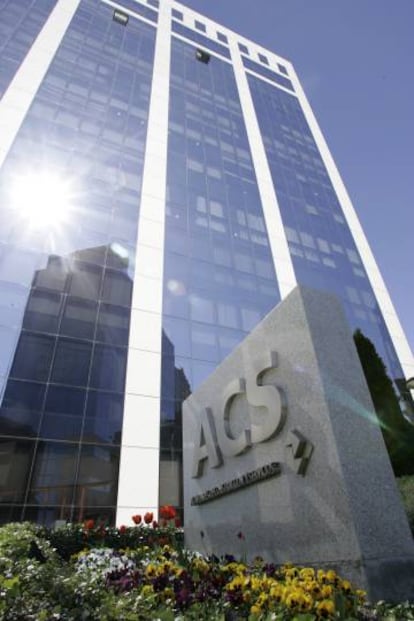How Spain’s corporations created an international business success story
Figures for 2015 show record sales of €55 billion from contracts in wide range of sectors around the world

Faced with slim pickings at home, Spanish companies are continuing to secure record earnings from international contracts, racking up deals abroad worth €55.35 billion in 2015, according to new data from Spain’s trade secretariat.
The figures are the highest ever, representing a 5% increase on 2014, even though the number of contracts signed, 451, is lower than the previous year’s 506.
Spain’s multinationals responded quickly to the financial crisis that began in 2008, when they were faced with a collapse in the domestic market, mounting debt and production structures that had long fed off European structural funding.
To put the 2015 figure in perspective, €55 billion is equivalent to half of what Spain spends on pensions each year. “They have had to reinvent themselves and they have been very successful in doing so, diversifying into services and internationalizing,” says one expert of Spain’s leading corporations.
Spanish companies have entered fields like environmental services and energy. Infrastructure and transportation now make up just 55% of the total number of international contracts
Eight years ago, the bulk of Spanish overseas contracts were in the construction sector, but since then, companies have entered fields like environmental services and energy, particularly renewables. Infrastructure and transportation now make up just 55% of the total number of contracts.
Spanish companies only began looking for markets outside Spain in 1992, but since then, the international arena has provided an increasingly important revenue stream, particularly from niche segments such as airport handling, concession, engineering, as well as trash collection and water treatment.
Spanish companies first moved into Latin America, but they have expanded into other regions as a growing number of countries there have entered recession over the last couple of years, notably into North America, Australia, the Gulf states and the Middle East, even seeing off Chinese competition.
“The Chinese did well initially because they were cheaper, but many countries have regretted the experience. In Qatar, during a blaze, mechanical fire escapes melted, and there were a number of deaths. In Kuwait, a desalination plant turned out to be a disaster. This has helped Spanish companies, who are able to combine price and quality,” says a diplomatic source.
According to US trade magazine Public Works Financing, in November of 2015 nine Spanish companies were among the world’s top 36 infrastructure concessionaires. Government figures show that eight Spanish companies were among the global 100 top exporters in 2014. ACS and Ferrovial occupied the top spot and the 15th position respectively.
A recent OECD report says that Spain’s large corporations are as productive as their German counterparts
Juan Lazcan, president of the CNC, Spain’s construction confederation, attributes the success of Spanish companies internationally to their human capital and investment in technology.
“Investment has been important, but we are also able to build at much lower prices than say, the French, and often in difficult terrain,” he says. A recent OECD report says that Spain’s large corporations are as productive as their German counterparts.
Spanish companies have also shown themselves skilled at working with local players, lobbying governments, and accessing international financial institutions.
Major international projects in 2015
- Latin America. Acciona and Brazil’s Odebrecht won the contract to build the second phase of the Quito (Peru) metro for €1.4 billion. FCC was awarded a €1.7 billion contract to extend the Panama City metro, while Isolux is to intall almost 700 kilometers of electricity transmission lines in Brazil.
- North America. ACS is part of a Canadian consortium that will build a new, €3.7 billion light metro line in Toronto. The company is also part of the €880 million US 181 Harbour Bridge Replacement in Corpus Christi.
- Europe. Along with Lain O’Rourke, Ferrovial is to build the central stretch of London’s new sewage system. Also in the UK, Abengoa had teamed up with Toshiba to build the world’s largest biomass electricity generation plant, but this has now been transferred to Técnicas Reunidas and Samsung. In Norway, Acciona won the contract to build a €1 billion high-speed rail line.
- Rest of the world. The consortium led by FCC Aqualia has won a €2.4 billion contract to build and operate Cairo’s new water treatment plant. Along with Saudi partner Acwa, Sener is to build phases two and three of the Ouarzazite solar plant. In Australia, ACS is to extend the M5 motorway outside Sydney, while Acciona is to build the Toowoomba bypass. In Kuwait, Técnicas Reunidas is part of a consortium to build the world’s largest refinery at a cost of €3.8 billion.
English version by Nick Lyne.
Sign up for our newsletter
EL PAÍS English Edition has launched a weekly newsletter. Sign up today to receive a selection of our best stories in your inbox every Saturday morning. For full details about how to subscribe, click here
Tu suscripción se está usando en otro dispositivo
¿Quieres añadir otro usuario a tu suscripción?
Si continúas leyendo en este dispositivo, no se podrá leer en el otro.
FlechaTu suscripción se está usando en otro dispositivo y solo puedes acceder a EL PAÍS desde un dispositivo a la vez.
Si quieres compartir tu cuenta, cambia tu suscripción a la modalidad Premium, así podrás añadir otro usuario. Cada uno accederá con su propia cuenta de email, lo que os permitirá personalizar vuestra experiencia en EL PAÍS.
¿Tienes una suscripción de empresa? Accede aquí para contratar más cuentas.
En el caso de no saber quién está usando tu cuenta, te recomendamos cambiar tu contraseña aquí.
Si decides continuar compartiendo tu cuenta, este mensaje se mostrará en tu dispositivo y en el de la otra persona que está usando tu cuenta de forma indefinida, afectando a tu experiencia de lectura. Puedes consultar aquí los términos y condiciones de la suscripción digital.









































